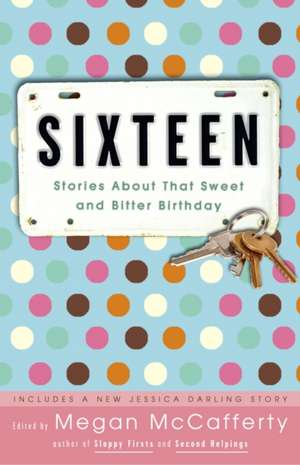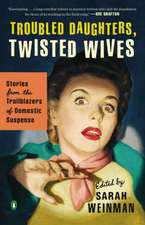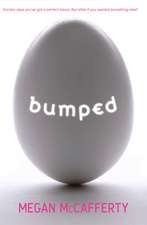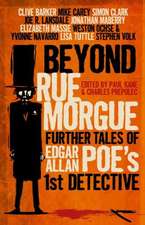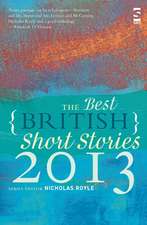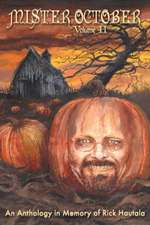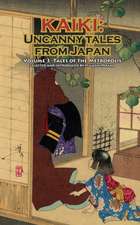Sixteen: Stories about That Sweet and Bitter Birthday
Editat de Megan McCaffertyen Limba Engleză Paperback – 30 apr 2004 – vârsta de la 14 până la 18 ani
Remember what it was like to be sixteen? Whether it was the year your teeth were finally free of braces or the year you were discovered by the opposite sex, that magical, mystical age is something you will never forget. Edited by Megan McCafferty, author of the runaway hit novels Sloppy Firsts and Second Helpings, Sixteen: Stories About That Sweet and Bitter Birthday is a compilation of short stories inspired by all the angst, melodrama, and wonderment of being sixteen.
Sarah Dessen’s “Infinity” is about a girl confronting two major milestones: getting her driver’s license and losing her virginity. The Dead Girls in Jacqueline Woodson’s “Nebraska 99” have already decided to “do it” and must now cope with being teenage mothers. And Carolyn Mackler’s “Mona Lisa, Jesus, Chad, and Me” explores whether friendship can survive when partying and prayer clash. Also included is a new Jessica Darling story by Megan McCafferty about the last fifteen minutes Jessica spends—or rather, doesn’t spend—with her best friend, Hope, who is leaving Pineville.
Featuring stories by Steve Almond, M. T. Anderson, Julianna Baggott, Cat Bauer, Emma Forrest, Tanuja Desai Hidier, David Levithan, Sarah Mlynowski, Sonya Sones, Zoe Trope, Ned Vizzini, and Joseph Weisberg, these hilarious, poignant, and touching tales are perfect for both those who have yet to reach that milestone and those who want to reminisce about their “sweetest” year.
Preț: 76.05 lei
Nou
Puncte Express: 114
Preț estimativ în valută:
14.55€ • 15.25$ • 12.03£
14.55€ • 15.25$ • 12.03£
Carte disponibilă
Livrare economică 21 martie-04 aprilie
Livrare express 07-13 martie pentru 20.24 lei
Preluare comenzi: 021 569.72.76
Specificații
ISBN-13: 9781400052707
ISBN-10: 140005270X
Pagini: 336
Dimensiuni: 133 x 204 x 19 mm
Greutate: 0.25 kg
Editura: BROADWAY BOOKS
ISBN-10: 140005270X
Pagini: 336
Dimensiuni: 133 x 204 x 19 mm
Greutate: 0.25 kg
Editura: BROADWAY BOOKS
Notă biografică
MEGAN McCAFFERTY is the author of Sloppy Firsts and Second Helpings. She lives with her husband and young son in New Jersey, and is currently at work on her third Jessica Darling novel. Find out more at www.meganmccafferty.com.
Extras
Sarah Dessen
Lately I don't dream about Anthony. I dream about the rotary.
Now, Mr. Haskell, my psychology teacher, would say this had implications. That somehow my fear of the rotary is linked to my issues with Anthony, which are both many and complicated. Mr. Haskell has a certain way he says things like this, leaning over with both elbows balanced on his lectern. It's very unsettling, as if he can see deep into your soul. But the truth is, I was scared of the rotary before I even met Anthony.
Most people don't even know what rotaries are. That's because most towns have those most modern of inventions, stoplights, to deal with traffic. Not here. Instead, some genius decided however many years ago to put in this big circle, with all the main roads feeding into it, then sat back to watch people crash to their deaths as they attempted to negotiate it.
But I digress.
My first experience with the rotary was when I was about seven. We'd just moved to town so that my father could finally finish his dissertation. My mother and I were on our way to the grocery store when we suddenly came upon this big sign that said yield with an arrow pointing to the right. Cars were going around a big circle, off of which poked several different exits to different roads. The trick, apparently, was to kind of merge in, follow around until your exit, then merge out. Simple as that.
"Oh my God," my mother said, poking her glasses up the bridge of her nose, which she always does when she's really nervous. "What is this?"
The answer came in the form of a loud, impatient beep from behind us. My mother looked nervously to her left, then tentatively poked at the gas pedal, sending us inching out into oncoming traffic. Another beep.
"Mom," I said.
"I'm merging!" she shrieked, as if this were on the level of splitting atoms and I was distracting her on purpose. And we were merging, pretty well, slowly easing into traffic. In fact, we were almost relaxed when we had to try to get back out; no easy trick, as there were many cars merging in. We got stuck on the inside track for two more turns, watching our exit go by, before my mother panicked and just sort of jerked the wheel, sending us in its general direction. And that was when the station wagon hit us.
The scene ensued the way you would expect: dents all around, tears (my mother), angry muttering (the guy who owned the station wagon), plus everyone else driving past rubbernecking and jawing to one another while I sank down as far as I could in the passenger seat, wishing there was a way to meld permanently with the pleather beneath me. The entire episode ended with a ticket, our insurance rates rising, and my mother swearing to never do the rotary ever again, which seemed somewhat overdramatic, until we realized that she meant it.
What this means, essentially, is that she has spent nine years taking the longest possible route everywhere. Because the rotary is the hub of our town, avoiding it takes work. And maps. And no end of secret shortcuts, long detours, and general embarrassment. Even a trip to the Quik Zip, basically about four miles from our house, requires getting on the highway, cutting (illegally) through the senior citizen compound, and making three left turns against oncoming traffic.
My father calls this ridiculous. He is a rotary champ, folding easily in and out, even while chatting on his cell phone or fiddling with the CD player. He is also a mathematician, something that my mother always brings up whenever the Rotary Argument commences, as if his proficiency with numbers is somehow involved in his mastery of the traffic circle. What all this has meant to me is that when it comes to going anywhere, I'm usually hoping it's my dad who grabs the keys to the sedan off the hook by the door first. Which will soon be a moot point, now that I'm about to turn sixteen and get my own license.
My boyfriend, Anthony, is a year older than me. He's good at the rotary, too, but he understands my hesitation. In fact, since I got my permit, we've spent a lot of time going in circles together, practicing. We started late at night, when it was pretty much deserted.
"Okay, now the first thing you're gonna do is stop and look to the left here," he instructed me one night. "There's someone coming, so unless they merge off before they get here, we'll wait for them to pass."
We waited. It was a Cadillac, moving slowly. It had the whole rotary to itself.
"Okay now," Anthony said. "Just ease out."
I did. Just as my mother had, all those years earlier. But this time there was no one coming; it was dark. No problem. But still my heart was beating hard, thumping against my chest, even as I picked up speed.
"See?" Anthony said, reaching over to squeeze my leg. He left his hand there, warm on my skin, as we eased around the circle. "Piece of cake, right?"
"Right," I said. We passed all the exits once, then started through again. Of course this was okay, I thought. Like a merry-go-round, only faster. But it was a trial run. And trial runs are always easier.
After a few more turns we were starting to get dizzy. Finally Anthony pointed toward the beach route exit, and I took it, following the bumpy road past subdivisions and marshes before finally hitting the turnoff to the shore parking lot. I slowed down, remembering the potholes, pulling up into a space right behind the lifeguard stand. Then I cut the engine.
"You did good tonight," Anthony said.
"Thanks," I said.
And then he leaned over and kissed me. I knew he would. I knew it just like I knew that after a few minutes he'd reach up and undo my shirt, then slide off my bra straps, easing me back against the seat behind me. He'd tell me he loved me, kiss my neck, run his hand down my back and into the waistband of my jeans, pressing his fingers there. I knew because we'd been practicing this, too, all this time, trial run after trial run. As with the rotary, what came next was obvious. And scary. And, it seemed, inevitable.
I'd been with Anthony for more than six months. We'd met at work: We both had jobs at Jumbo Smoothie. He worked the blenders, which was an advanced position, while I dumped sliced peaches and yogurt into cups, prepping. It wasn't a great job, but we got to play the radio and eat all the free smoothies we wanted, which was fun for the first week or so.
Anthony was tall, with a bony frame: He had big wrists, wild curly hair, and a sloping kind of walk that always made him look like he was taking his time. When he blended smoothies, he put his whole body into it, arms shaking, bouncing on the balls of his feet, as if the noise the blender made was music and he just couldn't help himself from dancing.
He wanted to sleep with me. He hadn't come out and said it, but he didn't really have to. He was a senior; we'd been together six months. Us having sex would be a natural progression, after kissing to letting him go up my shirt, then down my pants: Like moving from learner's permit to license, there's only one thing left. And so I have this choice. To either merge in or take the long way home.
"I'm so proud of you!"
That was my mother when I came out of the DMV office, holding my new license. It was still warm in my hand from where they'd laminated it, as if it were somehow alive.
"Let me see the picture," she said. She squinted down at it. "Very nice. You're not even blinking."
It was a decent shot. I'd even had a second to brush my hair while the guy was arguing with some woman over her picture--she'd blinked, I guess--which I figured was a bonus. And there, next to my face, was all my pertinent information. Height, weight, eye color. Birthday. And expiration date: 2007. Amazing. Where would I be in four years?
"McDonald's," my mother said when I asked her this. We were in the car. I was driving.
"What?" I said.
"I thought we should go to McDonald's," she said. She fiddled with her sun visor, up, then down. Although she'd never admit it, my mother was nervous riding with me. "To celebrate."
"Oh," I said. "Okay."
McDonald's was smack in the middle of the lunch rush, the noise of registers and commotion and the crackling of the drive-through speaker almost overpowering. My mother told me to go find a table, then stood in line clutching her purse. The people behind her were all public-works guys in orange jumpsuits, talking too loudly.
I found a table by the window and sat down. The surface was covered with salt, like a dusting of snow, too thin to see but you could feel it. I moved my finger through it, leaving a circle behind, until suddenly someone put his hands over my eyes.
"Guess who?" a voice said right next to my ear. It was Anthony. Without my sight, the McDonald's seemed to get quieter, as if you needed to see all the commotion for it to really be happening.
"I know it's you," I said softly, reaching up and putting my hands over his. I could feel the silver ring he wore on his index finger pressing gently against my eyelid, cool and smooth. He went to move his hands, the joke being over, but I kept them there for a second longer before he slipped loose and it was bright again.
"So, did you get it?" he asked, dropping one hand onto my neck and leaning over me. I reached into my pocket and pulled out my license, showing him. "Nice. Good picture, too. You're not even blinking or making a weird face."
"Nope," I said. Anthony's license picture was terrible. Just when the guy was about to pop the flash, someone slammed a door, and Anthony was startled: In the picture he looks surprised, as if his eyes are bugging out of his head. But it doesn't bother him. He says no one really looks like their license picture, anyway. "I'm lucky, I guess."
"Yes," he said, curving his hand around the back of my neck the way that always gave me chills. "You are."
"Well, hello there!" My mother set the tray down in front of me. Two chicken sandwiches with no mayo, two large fries, two Diet Cokes. We both always get the same thing. "Are you joining us?"
Anthony reached over, took one of my fries, and popped it into his mouth. "Nope," he said. "Some of us have to get back to school."
"Poor you," I said, taking my fries off the tray.
"I'll call you later," he said, bending down again and kissing my cheek in a very chaste, big-brother kind of way. Normally I would have at least gotten a kiss on the lips, but my mother was right there. Still, she ducked her head and pretended to be very busy opening ketchup packets until he walked away, waving once over his shoulder. "Get ready for that rotary!" he called out, and then the glass doors swung shut behind him.
My mother picked up her sandwich, adjusting the one piece of lettuce and one tomato: They never give you enough, and the distribution is always all wrong. "You know," she said finally, taking her first bite, "you don't have to do the rotary right away."
"I know," I said. We'd already discussed this during the weeks I'd had my permit, when she'd officially taught me all of her extended shortcuts. "But I think I should just go ahead and get it over with."
She took a sip of her drink and glanced out the window. We'd both known this day was coming, eventually. My mother and I were close, always had been. She didn't fall into any of the specific Mom types: She wasn't Nagging Mom, or Trying-to-Be-Young-and-Hip-Mom, or Superstrict Mom. My parents were rumpled academics. Books had been their greatest love, before me, and I just knew that when I had flown the nest and was long gone, they'd continue their set patterns, floating from the breakfast nook, which had the best morning light, to the big couch by the fireplace, where they could each take an armrest with their stacks of journals and novels between them. Sentences and paragraphs, themes and symbols--these were things my mother never feared. She had a Ph.D. and did the New York Times crossword every morning before she even had her first cup of coffee. Words didn't scare her, only shapes. Like circles.
She'd expected me to fall in with this. I knew it by the way she'd easily assumed I'd learn her shortcuts, memorizing them so that I, too, could take a four-mile circuitous route to the post office, which was, measured by the clean numbers of my odometer, a mere half mile away. My father had harrumphed at this, my mother's lessons in avoidance, and hinted broadly that maybe my induction into the driving public would be a good excuse for my mother to finally face this, the fear of all fears. But I, for one, doubted this would ever happen. My mother had gotten accustomed to taking the long way everywhere: It wasn't even a burden for her anymore. That's the thing about habits. And fears. At first they might seem like trouble, but eventually they just fold in, becoming part of the fabric, a jumped stitch you hardly notice except when someone else points it out.
Now, watching her sip her drink, I felt a tug of obligation. She was the lone rotary holdout, and wasn't it my duty, as her daughter, to stand with her in allegiance? On the other side was not only the rest of our town, but also, more important, my father, fearless warrior of traffic circles, and Anthony, who had crashed his parents' Volvo once on a rotary one town over and still not thought twice about going back for more. I longed for the simple, solid logic of traffic lights, no decisions necessary: Green means go, red means stop, yellow means slow down or run the light--make up your mind, though, because time's a-wasting. All straight lines, or variations thereof.
Out in the parking lot, my mother and I buckled up and I backed out slowly, careful of the cars lining up for the drive-through. "Good turning," she said, praising my slow but effective merging into traffic on the main road. She had her hands in her lap, fingers locked, and we didn't talk as we moved through three intersections, catching the green light at each. Up ahead I could see the signs for the rotary, warning us of its approach. My mother pulled her fingers tighter, like a Chinese puzzle, and looked out the window quickly, as if the office supply store on her right was suddenly fascinating.
Lately I don't dream about Anthony. I dream about the rotary.
Now, Mr. Haskell, my psychology teacher, would say this had implications. That somehow my fear of the rotary is linked to my issues with Anthony, which are both many and complicated. Mr. Haskell has a certain way he says things like this, leaning over with both elbows balanced on his lectern. It's very unsettling, as if he can see deep into your soul. But the truth is, I was scared of the rotary before I even met Anthony.
Most people don't even know what rotaries are. That's because most towns have those most modern of inventions, stoplights, to deal with traffic. Not here. Instead, some genius decided however many years ago to put in this big circle, with all the main roads feeding into it, then sat back to watch people crash to their deaths as they attempted to negotiate it.
But I digress.
My first experience with the rotary was when I was about seven. We'd just moved to town so that my father could finally finish his dissertation. My mother and I were on our way to the grocery store when we suddenly came upon this big sign that said yield with an arrow pointing to the right. Cars were going around a big circle, off of which poked several different exits to different roads. The trick, apparently, was to kind of merge in, follow around until your exit, then merge out. Simple as that.
"Oh my God," my mother said, poking her glasses up the bridge of her nose, which she always does when she's really nervous. "What is this?"
The answer came in the form of a loud, impatient beep from behind us. My mother looked nervously to her left, then tentatively poked at the gas pedal, sending us inching out into oncoming traffic. Another beep.
"Mom," I said.
"I'm merging!" she shrieked, as if this were on the level of splitting atoms and I was distracting her on purpose. And we were merging, pretty well, slowly easing into traffic. In fact, we were almost relaxed when we had to try to get back out; no easy trick, as there were many cars merging in. We got stuck on the inside track for two more turns, watching our exit go by, before my mother panicked and just sort of jerked the wheel, sending us in its general direction. And that was when the station wagon hit us.
The scene ensued the way you would expect: dents all around, tears (my mother), angry muttering (the guy who owned the station wagon), plus everyone else driving past rubbernecking and jawing to one another while I sank down as far as I could in the passenger seat, wishing there was a way to meld permanently with the pleather beneath me. The entire episode ended with a ticket, our insurance rates rising, and my mother swearing to never do the rotary ever again, which seemed somewhat overdramatic, until we realized that she meant it.
What this means, essentially, is that she has spent nine years taking the longest possible route everywhere. Because the rotary is the hub of our town, avoiding it takes work. And maps. And no end of secret shortcuts, long detours, and general embarrassment. Even a trip to the Quik Zip, basically about four miles from our house, requires getting on the highway, cutting (illegally) through the senior citizen compound, and making three left turns against oncoming traffic.
My father calls this ridiculous. He is a rotary champ, folding easily in and out, even while chatting on his cell phone or fiddling with the CD player. He is also a mathematician, something that my mother always brings up whenever the Rotary Argument commences, as if his proficiency with numbers is somehow involved in his mastery of the traffic circle. What all this has meant to me is that when it comes to going anywhere, I'm usually hoping it's my dad who grabs the keys to the sedan off the hook by the door first. Which will soon be a moot point, now that I'm about to turn sixteen and get my own license.
My boyfriend, Anthony, is a year older than me. He's good at the rotary, too, but he understands my hesitation. In fact, since I got my permit, we've spent a lot of time going in circles together, practicing. We started late at night, when it was pretty much deserted.
"Okay, now the first thing you're gonna do is stop and look to the left here," he instructed me one night. "There's someone coming, so unless they merge off before they get here, we'll wait for them to pass."
We waited. It was a Cadillac, moving slowly. It had the whole rotary to itself.
"Okay now," Anthony said. "Just ease out."
I did. Just as my mother had, all those years earlier. But this time there was no one coming; it was dark. No problem. But still my heart was beating hard, thumping against my chest, even as I picked up speed.
"See?" Anthony said, reaching over to squeeze my leg. He left his hand there, warm on my skin, as we eased around the circle. "Piece of cake, right?"
"Right," I said. We passed all the exits once, then started through again. Of course this was okay, I thought. Like a merry-go-round, only faster. But it was a trial run. And trial runs are always easier.
After a few more turns we were starting to get dizzy. Finally Anthony pointed toward the beach route exit, and I took it, following the bumpy road past subdivisions and marshes before finally hitting the turnoff to the shore parking lot. I slowed down, remembering the potholes, pulling up into a space right behind the lifeguard stand. Then I cut the engine.
"You did good tonight," Anthony said.
"Thanks," I said.
And then he leaned over and kissed me. I knew he would. I knew it just like I knew that after a few minutes he'd reach up and undo my shirt, then slide off my bra straps, easing me back against the seat behind me. He'd tell me he loved me, kiss my neck, run his hand down my back and into the waistband of my jeans, pressing his fingers there. I knew because we'd been practicing this, too, all this time, trial run after trial run. As with the rotary, what came next was obvious. And scary. And, it seemed, inevitable.
I'd been with Anthony for more than six months. We'd met at work: We both had jobs at Jumbo Smoothie. He worked the blenders, which was an advanced position, while I dumped sliced peaches and yogurt into cups, prepping. It wasn't a great job, but we got to play the radio and eat all the free smoothies we wanted, which was fun for the first week or so.
Anthony was tall, with a bony frame: He had big wrists, wild curly hair, and a sloping kind of walk that always made him look like he was taking his time. When he blended smoothies, he put his whole body into it, arms shaking, bouncing on the balls of his feet, as if the noise the blender made was music and he just couldn't help himself from dancing.
He wanted to sleep with me. He hadn't come out and said it, but he didn't really have to. He was a senior; we'd been together six months. Us having sex would be a natural progression, after kissing to letting him go up my shirt, then down my pants: Like moving from learner's permit to license, there's only one thing left. And so I have this choice. To either merge in or take the long way home.
"I'm so proud of you!"
That was my mother when I came out of the DMV office, holding my new license. It was still warm in my hand from where they'd laminated it, as if it were somehow alive.
"Let me see the picture," she said. She squinted down at it. "Very nice. You're not even blinking."
It was a decent shot. I'd even had a second to brush my hair while the guy was arguing with some woman over her picture--she'd blinked, I guess--which I figured was a bonus. And there, next to my face, was all my pertinent information. Height, weight, eye color. Birthday. And expiration date: 2007. Amazing. Where would I be in four years?
"McDonald's," my mother said when I asked her this. We were in the car. I was driving.
"What?" I said.
"I thought we should go to McDonald's," she said. She fiddled with her sun visor, up, then down. Although she'd never admit it, my mother was nervous riding with me. "To celebrate."
"Oh," I said. "Okay."
McDonald's was smack in the middle of the lunch rush, the noise of registers and commotion and the crackling of the drive-through speaker almost overpowering. My mother told me to go find a table, then stood in line clutching her purse. The people behind her were all public-works guys in orange jumpsuits, talking too loudly.
I found a table by the window and sat down. The surface was covered with salt, like a dusting of snow, too thin to see but you could feel it. I moved my finger through it, leaving a circle behind, until suddenly someone put his hands over my eyes.
"Guess who?" a voice said right next to my ear. It was Anthony. Without my sight, the McDonald's seemed to get quieter, as if you needed to see all the commotion for it to really be happening.
"I know it's you," I said softly, reaching up and putting my hands over his. I could feel the silver ring he wore on his index finger pressing gently against my eyelid, cool and smooth. He went to move his hands, the joke being over, but I kept them there for a second longer before he slipped loose and it was bright again.
"So, did you get it?" he asked, dropping one hand onto my neck and leaning over me. I reached into my pocket and pulled out my license, showing him. "Nice. Good picture, too. You're not even blinking or making a weird face."
"Nope," I said. Anthony's license picture was terrible. Just when the guy was about to pop the flash, someone slammed a door, and Anthony was startled: In the picture he looks surprised, as if his eyes are bugging out of his head. But it doesn't bother him. He says no one really looks like their license picture, anyway. "I'm lucky, I guess."
"Yes," he said, curving his hand around the back of my neck the way that always gave me chills. "You are."
"Well, hello there!" My mother set the tray down in front of me. Two chicken sandwiches with no mayo, two large fries, two Diet Cokes. We both always get the same thing. "Are you joining us?"
Anthony reached over, took one of my fries, and popped it into his mouth. "Nope," he said. "Some of us have to get back to school."
"Poor you," I said, taking my fries off the tray.
"I'll call you later," he said, bending down again and kissing my cheek in a very chaste, big-brother kind of way. Normally I would have at least gotten a kiss on the lips, but my mother was right there. Still, she ducked her head and pretended to be very busy opening ketchup packets until he walked away, waving once over his shoulder. "Get ready for that rotary!" he called out, and then the glass doors swung shut behind him.
My mother picked up her sandwich, adjusting the one piece of lettuce and one tomato: They never give you enough, and the distribution is always all wrong. "You know," she said finally, taking her first bite, "you don't have to do the rotary right away."
"I know," I said. We'd already discussed this during the weeks I'd had my permit, when she'd officially taught me all of her extended shortcuts. "But I think I should just go ahead and get it over with."
She took a sip of her drink and glanced out the window. We'd both known this day was coming, eventually. My mother and I were close, always had been. She didn't fall into any of the specific Mom types: She wasn't Nagging Mom, or Trying-to-Be-Young-and-Hip-Mom, or Superstrict Mom. My parents were rumpled academics. Books had been their greatest love, before me, and I just knew that when I had flown the nest and was long gone, they'd continue their set patterns, floating from the breakfast nook, which had the best morning light, to the big couch by the fireplace, where they could each take an armrest with their stacks of journals and novels between them. Sentences and paragraphs, themes and symbols--these were things my mother never feared. She had a Ph.D. and did the New York Times crossword every morning before she even had her first cup of coffee. Words didn't scare her, only shapes. Like circles.
She'd expected me to fall in with this. I knew it by the way she'd easily assumed I'd learn her shortcuts, memorizing them so that I, too, could take a four-mile circuitous route to the post office, which was, measured by the clean numbers of my odometer, a mere half mile away. My father had harrumphed at this, my mother's lessons in avoidance, and hinted broadly that maybe my induction into the driving public would be a good excuse for my mother to finally face this, the fear of all fears. But I, for one, doubted this would ever happen. My mother had gotten accustomed to taking the long way everywhere: It wasn't even a burden for her anymore. That's the thing about habits. And fears. At first they might seem like trouble, but eventually they just fold in, becoming part of the fabric, a jumped stitch you hardly notice except when someone else points it out.
Now, watching her sip her drink, I felt a tug of obligation. She was the lone rotary holdout, and wasn't it my duty, as her daughter, to stand with her in allegiance? On the other side was not only the rest of our town, but also, more important, my father, fearless warrior of traffic circles, and Anthony, who had crashed his parents' Volvo once on a rotary one town over and still not thought twice about going back for more. I longed for the simple, solid logic of traffic lights, no decisions necessary: Green means go, red means stop, yellow means slow down or run the light--make up your mind, though, because time's a-wasting. All straight lines, or variations thereof.
Out in the parking lot, my mother and I buckled up and I backed out slowly, careful of the cars lining up for the drive-through. "Good turning," she said, praising my slow but effective merging into traffic on the main road. She had her hands in her lap, fingers locked, and we didn't talk as we moved through three intersections, catching the green light at each. Up ahead I could see the signs for the rotary, warning us of its approach. My mother pulled her fingers tighter, like a Chinese puzzle, and looked out the window quickly, as if the office supply store on her right was suddenly fascinating.
Descriere
McCafferty has compiled a collection of short stories that captures all of the angst, drama, and wonder of that oddly important milestone age. Other featured authors include Meg Cabot ("The Princess Diaries"), Emma Forrest, and Julianna Baggott ("Girl Talk").
